MICROSOFT NEWS: 70-336 Exam Questions has been Updated Today! Get Latest 70-336 VCE and 70-336 PDF Instantly! Welcome to Download the Newest Braindump2go 70-336 VCE&70-336 PDF Dumps: http://www.braindump2go.com/70-336.html (110 Q&As)
Braindump2go New Released 70-336 Microsoft Exam Dumps Free Download Today! All 110q 70-336 Exam Questions are the new updated from Microsoft Official Exam Center.Braindump2go Offers 70-336 PDF Dumps and 70-336 VCE Dumps for free Download Now! 100% pass 70-336 Certification Exam!
Exam Code: 70-336
Exam Name: Core Solutions of Microsoft Lync Server 2013
Certification Provider: Microsoft
Corresponding Certifications: MCSE, MCSE: Communication
70-336 Dump.70-336 PDF,70-336 VCE,70-336 Study Guide,70-336 Book,70-336 Exam Questions,70-336 eBook,70-336 Exam Guide,70-336 Exam Prep,70-336 Braindump,70-336 Practice Test,70-336 Practice Exam
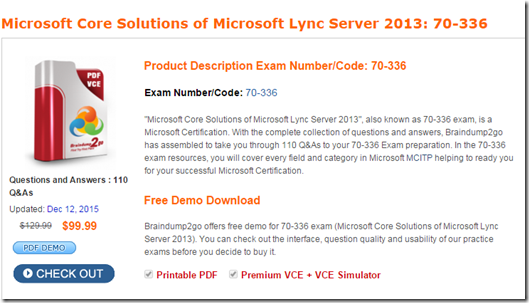
QUESTION 11
Drag and Drop Question
You have a Lync Server 2013 infrastructure that contains two servers.
The servers are configured as shown in the following table.

You deploy two new servers.
The servers are configured as shown in the following table.

You need to recommend changes to the infrastructure to meet the following requirements:
– Ensure that remote users can connect to the network by using Microsoft Lync 2013.
– Ensure that Server3 authenticates the remote users before the users connect to a Front End Server.
Which Lync Server 2013 server role should you recommend deploying to each server? To answer, drag the appropriate server role to the correct server in the answer area. Each server role may be used once, more than once, or not at all. Additionally, you may need to drag the split bar between panes or scroll to view content.
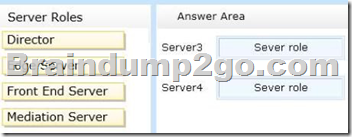
Answer:
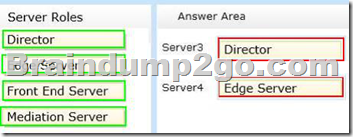
QUESTION 12
You have a Lync Server 2010 infrastructure.
You plan to migrate to Lync Server 2013.
You have four client computers.
The client computers are configured as shown in the following table.
You need to identify which client computer types can use audio conferencing hosted on Lync Server 2013 without installing any additional software on the client computers.
Which client computer types should you identify?

A. A
B. B
C. C
D. D
Answer: D
Explanation:
http://technet.microsoft.com/en-us/library/jj204672.aspx

Client Interoperability in Lync 2013
This topic discusses the ability of Microsoft Lync Server 2013 clients to coexist and interact with clients from earlier versions of Lync Server and Office Communications Server.Server and Client Compatibility.
The following table shows the supported combinations of client versions and server versions.
This table indicates whether sign-in is supported when the client attempts to connect to the server indicated. Lync Server 2013 supports the previous client version.
Also, unlike previous releases, Lync Server 2010 supports the new Lync 2013 clients.
This allows organizations who are upgrading from Lync Server 2010 to roll out new clients independent of Lync Server upgrades.

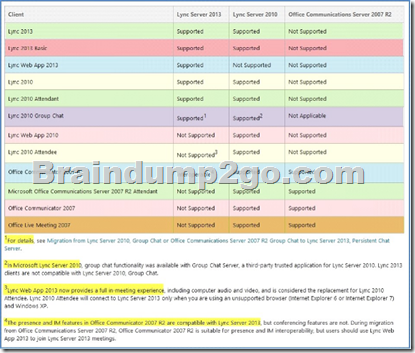
Interoperability among Clients
With the Lync Server 2013 release, various client versions can interact seamlessly in both peer-to-peer and conferencing scenarios. This section discusses feature availability when users interact with other users who are using different versions of clients and servers.
Peer-to-Peer Feature Support
Peer-to-peer features are supported for users who are homed on different versions of the server and who are using different client versions. The end-user experience and available features are consistent with the capabilities of the user’s client and the version of the server the user is signed in to. In other words:
If a user is signed in to Lync Server 2013 with an older client, the user will have the same experience he or she is used to. None of the new features introduced in Lync Server 2013 will be available until the user’s client is upgraded. If a user is signed in to Lync Server 2010 with a Lync 2013 client, any new features not supported by Lync Server 2010 will be unavailable until the user is moved to Lync Server 2013.
The following table compares feature availability in peer-to-peer sessions where the client is signed in to either Lync Server 2013 or Lync Server 2010.
Note:
Lync Web App and Lync 2010 Attendee are meeting-only clients and aren’t included in this table.
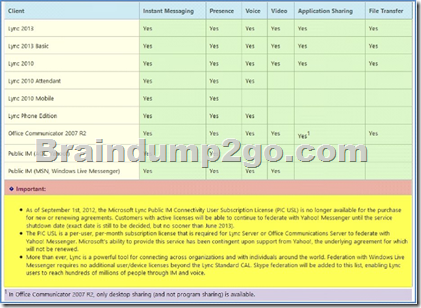
Conferencing Feature Support
In Lync Server 2013 meetings, conferencing features are supported for users who are homed on different versions of the server and who are using different clients and client versions.
When clients join a Lync Server 2013 meeting, users have access to the features and capabilities shown in this table.

1. In Office Communicator 2007 R2, only desktop sharing (and not program sharing) is available.
2. Lync Server 2013 uses an updated mechanism for uploading PowerPoint files. Lync Web App users who join a meeting that was originally scheduled on Lync Server 2010 can view and navigate PowerPoint presentations, but cannot upload PowerPoint files.
3. If the meeting was scheduled on Lync Server 2013 and PowerPoint slides were uploaded by a Lync 2013 client, Lync 2010 users have view-only access to the slides. Conversely, if the PowerPoint slides were uploaded by a Lync 2010 user, Lync Server 2013 users will be able to view and slides and, if Office Web Apps Server is configured, access new capabilities such as higher resolution display, animations, slide transitions, and embedded video. For more information, see Configuring Integration with Office Web Apps Server and Lync Server 2013.
4. The presence and IM features in Office Communicator 2007 R2 are compatible with Lync Server 2013, but conferencing features are not. During migration from Office Communications Server 2007 R2, Office Communicator 2007 R2 is suitable for presence and IM interoperability, but users should use Lync Web App 2013 to join Lync Server 2013 meetings.
Scheduling Add-in Support
Server support for the various scheduling add-ins is consistent with server and client version compatibility. In general, the following scheduling add-ins are supported on Lync Server 2013. However, previous versions of add-ins do not provide new Lync 2013 add-in features, such as the option to mute all attendee audio and video upon meeting entry.
Online Meeting Add-in for Lync 2013 Provides the same features as the Online Meeting Add-in for Lync 2010, with the addition of attendee mute controls, which allow meeting organizers to schedule conferences that have attendee audio and video muted by default. Administrators can also customize the organization’s meeting invitations by adding a custom logo, a support URL, a legal disclaimer URL, or custom footer text. Online Meeting Add-in for Lync 2010 Provides scheduling for Lync meetings and removes the capability to schedule Office Live Meeting conferences. Office Communicator 2007 R2 Conferencing Add-in Provides scheduling for both Office Live Meeting conferences and Office Communicator 2007 R2 conferences.
Note:
Live Meeting conferences cannot be scheduled on Lync Server 2013.

Support for Joining Meetings
All of the clients that Lync Server 2013 supports are allowed to join Lync 2013 meetings.
Because Lync Web App is a web component of the server, in cases where Lync Web App is used to join a Lync Server 2013 meeting, the newer version of Lync Web App is always used.
Lync 2013 clients can join meetings hosted on Lync 2010 and Office Communications Server 2007 R2 with scaled-down functionality. In-meeting features are limited by the version of the server on which the meeting is hosted.
QUESTION 13
Drag and Drop Question
You have a Lync Server 2013 infrastructure.
You need to configure Lync Server 2013 to meet the following conferencing requirements:
– Ensure that a legal disclaimer is added to all meeting invitations.
– Ensure that only Microsoft Lync 2013 clients can be used to join conferences.
– Ensure that meeting organizers manually admit remote meeting attendees who are users in your company.
Which cmdlets should you run? To answer, drag the appropriate cmdlet to the correct requirement in the answer area. Each cmdlet may be used once, more than once, or not at all. Additionally, you may need to drag the split bar between panes or scroll to view content.
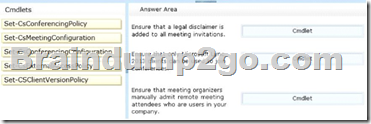
Answer:
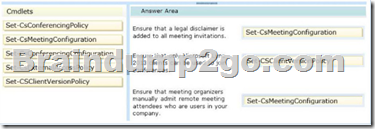
QUESTION 14
You have a Lync Server 2013 infrastructure.
Your company has a sales department and a research department.
You deploy persistent chat.
You need to configure persistent chat to meet the following requirements:
– Users in the sales department must be prevented from viewing the names of the rooms used by the research department.
– Users in the research department must be able to discover all of the rooms used by their department.
What should you do?
A. Create a user-level Persistent Chat Policy named Sales.
Apply the Sales policy to the sales and research users.
Create persistent chat rooms for each department and set the privacy to Secret.
B. Create a category named ResearchRooms.
Add the research users as Allowed members to the ResearchRooms category.
Add the sales users as Denied members to the ResearchRooms category.
Create persistent chat rooms for each department and set the privacy to Closed.
C. Create a category named ResearchRooms.
Add the research users as Allowed members to the ResearchRooms category.
Add the sales users as Denied members to the ResearchRooms category.
Create persistent chat rooms for each department and set the privacy to Secret.
D. Create a user-level Persistent Chat Policy named Sales.
Apply the Sales policy to the sales and research users.
Create persistent chat rooms for each department and set the privacy to Open.
Answer: C
Explanation:
http://technet.microsoft.com/en-us/library/jj204859.aspx
http://technet.microsoft.com/en-us/library/jj205166.aspx
QUESTION 15
Drag and Drop Question
Your network contains the servers that are configured as shown in the following table.
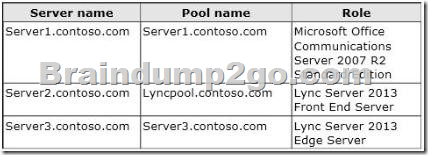
You move all users to Lync Server 2013.
You need to decommission Office Communications Server 2007 R2.
Which four actions should you perform? To answer, move the four appropriate actions from the list of actions in the answer area and arrange them in the correct order.
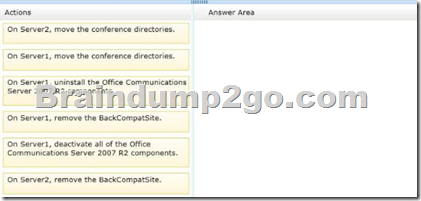
Answer:
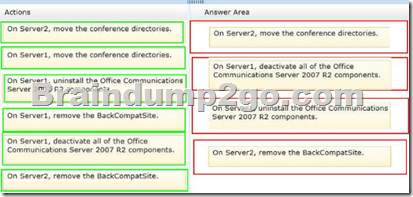
QUESTION 16
Your company has a main office and a branch office.
The main office has 3,000 users. The branch office has 100 users.
The offices are connected via a WAN link.
You have a Lync Server 2013 infrastructure.
The main office has a pool named Pool1 that contains two Enterprise Edition Front End Servers. The branch office only contains an Active Directory domain controller and a file server.
You need to recommend a high-availability solution to ensure that users can establish calls if one of the following components fails:
– A Front End Server
– A PSTN gateway
– A WAN router
The solution must minimize deployment and maintenance costs.
What should you recommend?
A. In the branch office, deploy a second Enterprise Edition pool named Pool2.
Configure Pool1 to use Pool2 as a backup pool.
Configure one trunk in Pool1.
Configure one trunk in Pool2.
B. In the branch office, deploy an SBA named SBA1.
Configure SBA1 to use Pool1 as a backup registrar.
Configure two trunks in Pool1.
Configure one trunk in SBA1.
C. In the main office, deploy a second Enterprise Edition pool named Pool2.
In the branch office, deploy an SBA named SBA1.
Configure SBA1 to use Pool2 as a backup registrar.
Configure two trunks in Pool1.
Configure two trunks in SBA1.
D. In the branch office, deploy a second Enterprise Edition pool named Pool2.
Configure Pool1 to use Pool2 as a backup pool.
Configure two trunks in Pool1.
Configure two trunks in Pool2.
Answer: B
Explanation:
An SBA is the only solution in the Branch as an SBA has an Analog Gateway built in and will resolve the “a WAN Router” failure.
Don’t need an Enterprise Edition Pool in the Branch Office for 100 users.
Answer C: is overkill, don’t need a second pool in Head Office.
QUESTION 17
You deploy a Lync Server 2013 infrastructure that contains four servers.
The servers are configured as shown in the following table.
You need to deploy a Persistent Chat pool.
The solution must use the least amount of servers.
On which server should you install the Persistent Chat Server role?
A. Lync1
B. Lync2
C. Lync3
D. Lync4
E. A new server
Answer: B
QUESTION 18
You have a Lync Server 2013 infrastructure that contains four servers.
The servers are configured as shown in the following table.

You run the Get-CsManagementStoreReplicationStatus cmdlet and discover the following replication issue:
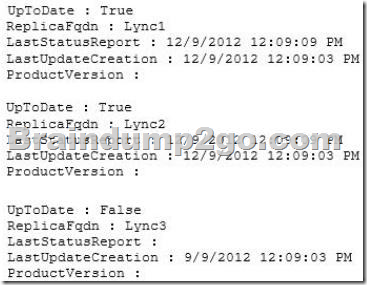
From Telnet, you verify that you can connect to Lync3 over TCP ports 443, 4443, 5061, and 5062.
You republish the topology successfully and you restart Lync3.
You need to identify what is causing the replication issue.
What should you identify?
A. A firewall issue
B. A failed service
C. A share permission issue
D. A certificate issue
E. A routing issue
Answer: D
Explanation:
Not Firewall issue as you can telnet to the ports.
Not a Failed Service as you can telnet to the ports.
Not a Share Permissions issue as replication is working with the other 2 servers.
Not Routing Issue, routing is working as telnet is functional.
QUESTION 19
You have two servers named Lync1 and Lync2 that have Lync Server 2013 Standard Edition deployed.
The servers are located in different buildings.
Lync1 hosts response groups.
You need to ensure that Lync2 can host the response groups if Lync1 fails.
Which cmdlet should you run first?
A. Export-CsConfiguration
B. Export-CsRgsConfiguration
C. Backup-CsPool
D. Move-CsRgsConfiguration
Answer: B
Explanation:
http://technet.microsoft.com/en-us/library/jj205011.aspx
Reference:
Export-CsRgsConfiguration
Untitled
Export-CsRgsConfiguration
Detailed Description
The Export-CsRgsConfiguration cmdlet and the Import-CsRgsConfiguration cmdlet enable you to export data about your current implementation of the Response Group application (including such things as workflows, queues, agent groups, holiday sets and business hours, as well as audio files and service configuration settings) and then later import (or re-import) that information.
This can be extremely useful in a disaster recovery scenario (for example, in a case where the server hosting the Response Group application has failed) or if you simply need to transfer the Response Group application to a different pool.
Note that the Export-CsRgsConfiguration cmdlet and the Import-CsRgsConfiguration cmdlet are designed to work only with Lync Server 2013.
If you want to migrate Response Group data from Microsoft Lync Server 2010 to Lync Server 2013, you should use the Move-CsRgsConfiguration cmdlet instead.
Export-CsRgsConfiguration -Source “ApplicationServer:atl-rgs-001.litwareinc.com” – FileName “C:\Exports\Rgs.zip”
To return a list of all the role-based access control (RBAC) roles this cmdlet has been assigned to (including any custom RBAC roles you have created yourself), run the following command from the Windows PowerShell command-line interface prompt:
Get-CsAdminRole | Where-Object {$_.Cmdlets -match “Export-CsRgsConfiguration”}
Lync Server Control Panel: The functions carried out by the Export-CsRgsConfiguration cmdlet are not available in the Lync Server Control Panel.
QUESTION 20
Drag and Drop Question
You have a Lync Server 2013 infrastructure.
You need to recommend which tools must be used to gather information to troubleshoot issues related to the following:
– Routing calls between internal users
– Routing outbound calls handled by Lync Server 2013
Which tool should you recommend? To answer, drag the appropriate tool to the correct location in the answer area. Each tool may be used once, more than once, or not at all. Additionally, you may need to drag the split bar between panes or scroll to view content.

Answer:

Braindump2go 70-336 Latest Updaed Braindumps Including All New Added 70-336 Exam Questions from Exam Center which Guarantees You Can 100% Success 70-336 Exam in Your First Try Exam!
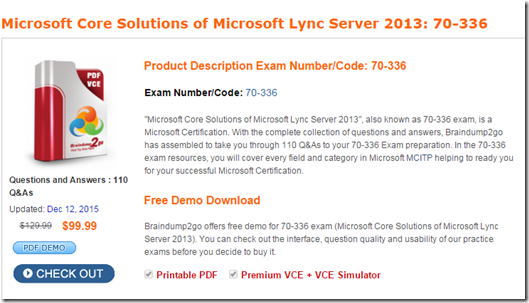
FREE DOWNLOAD: NEW UPDATED 70-336 PDF Dumps & 70-336 VCE Dumps from Braindump2go: http://www.braindump2go.com/70-336.html (110 Q&As)